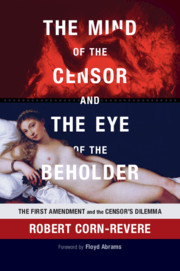Book contents
- Advance praise for The Mind of the Censor and the Eye of the Beholder
- The Mind of the Censor and the Eye of the Beholder
- The Mind of the Censor and the Eye of the Beholder
- Copyright page
- Contents
- Figures
- Dedication
- Foreword
- Acknowledgments
- Permissions
- 1 The Censor’s Dilemma
- 2 Anthony Comstock: Professional Anti-vice Crusader
- 3 Comstock’s Legacy: A Dilemma Is Born
- 4 The Comstock Playbook
- 5 Seduction of the Innocent: The Comic Book Menace
- 6 Ya Got Trouble: Censorship and Popular Music
- 7 The Vast Wasteland
- 8 New Age Comstockery: The Indecency Wars
- 9 The Anti-free Speech Movement
- 10 Freedom of Speech and the Spirit of Liberty
- Epilogue
- References
- Index
8 - New Age Comstockery: The Indecency Wars
Published online by Cambridge University Press: 07 October 2021
- Advance praise for The Mind of the Censor and the Eye of the Beholder
- The Mind of the Censor and the Eye of the Beholder
- The Mind of the Censor and the Eye of the Beholder
- Copyright page
- Contents
- Figures
- Dedication
- Foreword
- Acknowledgments
- Permissions
- 1 The Censor’s Dilemma
- 2 Anthony Comstock: Professional Anti-vice Crusader
- 3 Comstock’s Legacy: A Dilemma Is Born
- 4 The Comstock Playbook
- 5 Seduction of the Innocent: The Comic Book Menace
- 6 Ya Got Trouble: Censorship and Popular Music
- 7 The Vast Wasteland
- 8 New Age Comstockery: The Indecency Wars
- 9 The Anti-free Speech Movement
- 10 Freedom of Speech and the Spirit of Liberty
- Epilogue
- References
- Index
Summary
Chapter 8 explores the rise and fall of the FCC’s policy against broadcast indecency by following the exploits of anti-indecency crusader Brent Bozell, founder of the Parents Television Council (PTC).It traces the beginnings of the FCC’s policy in the early days of radio, and how it was transformed as courts began to develop First Amendment doctrine. It explains the birth of the FCC’s current indecency policy with its action against George Carlin’s “seven dirty words,” and how it was driven by political demands to get tough on broadcasters. This reached a crescendo because of the efforts of Bozell’s PTC and similar groups, who bombarded the FCC with spam email campaigns. Politicians responded by imposing skyrocketing fines based on an increasingly incoherent and confusing policy. The widespread chilling effect on broadcasters led courts to rein in the FCC’s authority in this area. Bozell and his fellow crusaders managed only to discredit themselves, to diminish the influence of their organizations, and to undermine FCC authority over broadcast content.
Keywords
Information
- Type
- Chapter
- Information
- The Mind of the Censor and the Eye of the BeholderThe First Amendment and the Censor's Dilemma, pp. 193 - 239Publisher: Cambridge University PressPrint publication year: 2021
